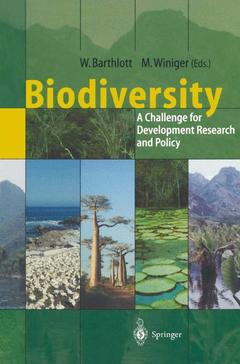Description
Biodiversity, 2001
A Challenge for Development Research and Policy
Coordinators: Barthlott Wilhelm, Winiger Matthias
Language: English
Subjects for Biodiversity:
Biodiversity
Publication date: 12-2010
429 p. · 15.5x23.5 cm · Paperback
Publication date: 12-2010
429 p. · 15.5x23.5 cm · Paperback
Biodiversity: a challenge for development research & policy
Publication date: 04-2001
429 p. · 15.5x23.5 cm · Hardback
Publication date: 04-2001
429 p. · 15.5x23.5 cm · Hardback
Description
/li>Contents
/li>Comment
/li>
Biodiversity, sometimes simply understood as "diversity of species", is a specific quality of life on our planet, the dimensions and importance of which have just lately been fully realized. Today we know that "biological diversity is a global asset of incalculable value to present and future generations" (Kofi Annan). Biodiversity is spread unequally over the world: in fact, the main share of biological resources worldwide is harboured predominantly by the so-called developing countries in the tropics and sub tropics. Therefore, Biodiversity - A Challenge for Development Research and Policy was chosen as the title for an international conference which was held in Bonn in 1997 as one of the first major events organized by the then newly established North-South Centre for Development Research (ZEF) at Rheinische Friedrich-Wilhelms-Universitat Bonn (Germany). Since the ZEF, founded by the Senate of the University of Bonn in 1995, has played a central role in turning Bonn into a centre for international cooperation and North-South dialogue. The Centre is a product of the Bonn Berlin agreement of July 1994 which was adopted to offset the effects caused by the Parliament and much of the Government moving to Berlin. It fits in well with the double strategy to strengthen Bonn's position as an interna tional science arena and as an eminent place for development policy and the national and supranational agencies dealing with this issue.
Biodiversity — Is there a Second Chance?.- Knotted Ropes, Rings, Lattices and Lace: Retrofitting Biodiversity into the Cultural Landscape.- Teaching Sustainable Management of Renewable Resources.- Marine Biodiversity — Thoughts on the Subjects and their Investigators.- Aspects of Botanical Biodiversity in Southern African Arid Regions — An Outline of Concepts and Results.- The Surumoni Project: The Botanical Approach Toward Gaining an Interdisciplinary Understanding of the Functions of the Rain Forest Canopy.- Zonal Features of Phytodiversity under Natural Conditions and under Human Impact — a Comparative Survey.- Fluctuations, Chaos and Succession in a Living Environment.- Landscape Diversity — a Holistic Approach.- Loss of Biodiversity in European Agriculture during the 20th Century.- Traditional Use of Tropical Biodiversity in Melanesia.- Science and Technology — Sustainable Economics (condensed version).- Biodiversity — Resource for New Products, Development and Self-Reliance.- Access to Genetic Resources and Benefit Sharing.- Bolivia is a Megadiversity Country and a Developing Country.- Floristic Inventory of Bolivia — an Indispensable Contribution to Sustainable Development?.- Richness and Utilization of Palms in Bolivia — some Essential Criteria for their Management.- Diversity of Mammals in Bolivia.- Geoecology and Biodiversity — Problems and Perspectives for the Management of Natural Resources of Bolivia’s Forest and Savanna Ecosystems.- Priorities for Conservation in Bolivia, Illustrated by a Continent-Wide Analysis of Bird Distributions.- Amphibian Species Diversity in Bolivia.- Land Use, Economy and the Conservation of Biodiversity of High-Andean Forests in Bolivia.- Using Lake Titicaca’s Biological Resources — Problems andAlternatives.- Conservation of Biodiversity: a National Task.- Friends of Nature Foundation (FAN Bolivia) — The Involvement of NGOs in Conservation in Bolivia.- Development and Biodiversity Conservation in Bolivia — A Call for Research and Action.- List of Contributors.
Interdisziplinärer Ansatz mit besonderer Berücksichtigung der Abhängigkeiten zwischen sozialen, kulturellen und ökologischen Systemen.
© 2024 LAVOISIER S.A.S.




